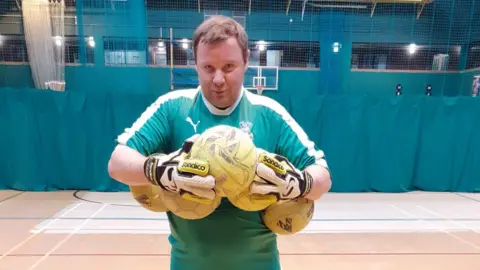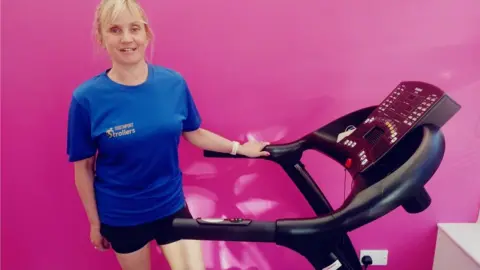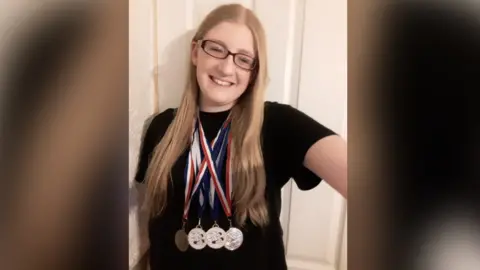Coronavirus: Many still missing sport and its social side
For many, the easing of restrictions to permit "unlimited exercise" and allow some activities such as golf and tennis to resume came as a relief.
But close contact sports are still off-limits, as are swimming pools and leisure centres. For some, their swimming clubs, football teams or running groups were more than about keeping fit, they were a lifeline to them. How are they coping?
Video calls help fill the social gap

William Castle plays in goal for Northampton Town FC multi-disabled football club.
The 43-year-old was diagnosed with autism almost a decade ago and found playing football gave him an opportunity to meet people and make friends.
It was his main form of exercise too.
But with social distancing measures in place, there has been no Friday weekly training nor monthly trips to Oxford where they play matches.
He said: "Football is a lifeline to me, I get to see my mates and get to see everybody."
Furthermore, he's been furloughed from his job, is unable to carry out his usual voluntary work at the local library or watch Crystal Palace play.
William, who lives with his mum and step-dad, says he's finding it "really strange" and wants "the whole thing to be over and done with".
To help keep him in touch with his club mates, he's been joining in with conversations and quizzes with other players via Zoom.
"That's been really good actually, seeing all my mates and talking to them," he said.
'I miss running outside'

Visually impaired runner Kelly Barton had been training for the London Marathon before it was rescheduled due to the coronavirus pandemic.
The 43-year-old would normally run with her running club, the Southport Strollers near Liverpool, and a number of guides throughout the week.
And although she lives with her partner, Mike Leatherbarrow, and could go out for runs with him, she said she was "too scared".
"We tried it once and I felt really worried as we're two across the pavement.
"It's not fair on other people either and we had to zig-zag and it was really disorientating."
Instead she's been sticking to running on a treadmill at home six times a week.
"It's horrendous, but at least I'm keeping my fitness up.
"I miss running outside - the social aspect and the fresh air on your face, it's more exhilarating outside, and I miss Parkrun."
Ever since she started running in 2016, she said she has felt like "part of the community".
But she said she felt like she had lost some independence during lockdown as she will not even go out for a walk on her own because "you don't know how near or far you are from people".
And although she's part of her running club's WhatsApp group, she says it is not the same as spending time with them.
"A lot of the things that they are chatting about are really visual things like seeing the rainbows and photos they are sharing but if you can't see, you can't be part of that."
Nonetheless, Kelly says she's "really lucky" as she lives with Mike and her 14-year-old son Olly, and is able to go outside for walks in their company or for a bike ride on a tandem.
'Swimming was my only form of exercise'
 KAtie Mahers
KAtie MahersKatie Mahers has been a member of Phoenix Swimming Club for Disabled People in Coventry for two years.
The 17-year-old started swimming with the club after she had major spinal surgery to correct scoliosis which left her partially paralysed in her left leg.
After undergoing an emergency operation, she was advised to do hydrotherapy for strength building.
She went along to the swimming club and within a handful of sessions had grasped how to swim.
The teenager said swimming "really helps" because she struggles with regular exercise due to heart problems, fainting, pain and joint problems.
"It helps me maintain some muscle without being too strenuous," she said.
But with pools closed due to the coronavirus restrictions, she said not only has she lost her only form of exercise, but the social side too.
"The club helps because it's nice to socialise with people who know what it's like to not be capable of doing exercise 'normally', so it just normalises it for me and is very comforting.
"I've met a lot of amazing people through this group, and I've definitely achieved more than I could've ever expected thanks to the outstanding staff, who go above and beyond to help people adapt the way swimming can be done to adhere to disabilities ranging from physical to mental," she said.
The Royal Air Force cadet said since the club had to close for safety reasons due to Covid-19, she had not really been exercising much besides her physiotherapy exercises.
"I definitely have lost most of my strength due to not swimming and outside of the club I don't really speak to the members on social media, and a lot of them don't have social media.
"So I miss the physical aspect but also the social aspect, it's always pretty lively when I'm there and I really enjoy it."

- A SIMPLE GUIDE: How do I protect myself?
- IMPACT: What the virus does to the body
- RECOVERY: How long does it take?
- LOCKDOWN: How can we lift restrictions?
- ENDGAME: How do we get out of this mess?

